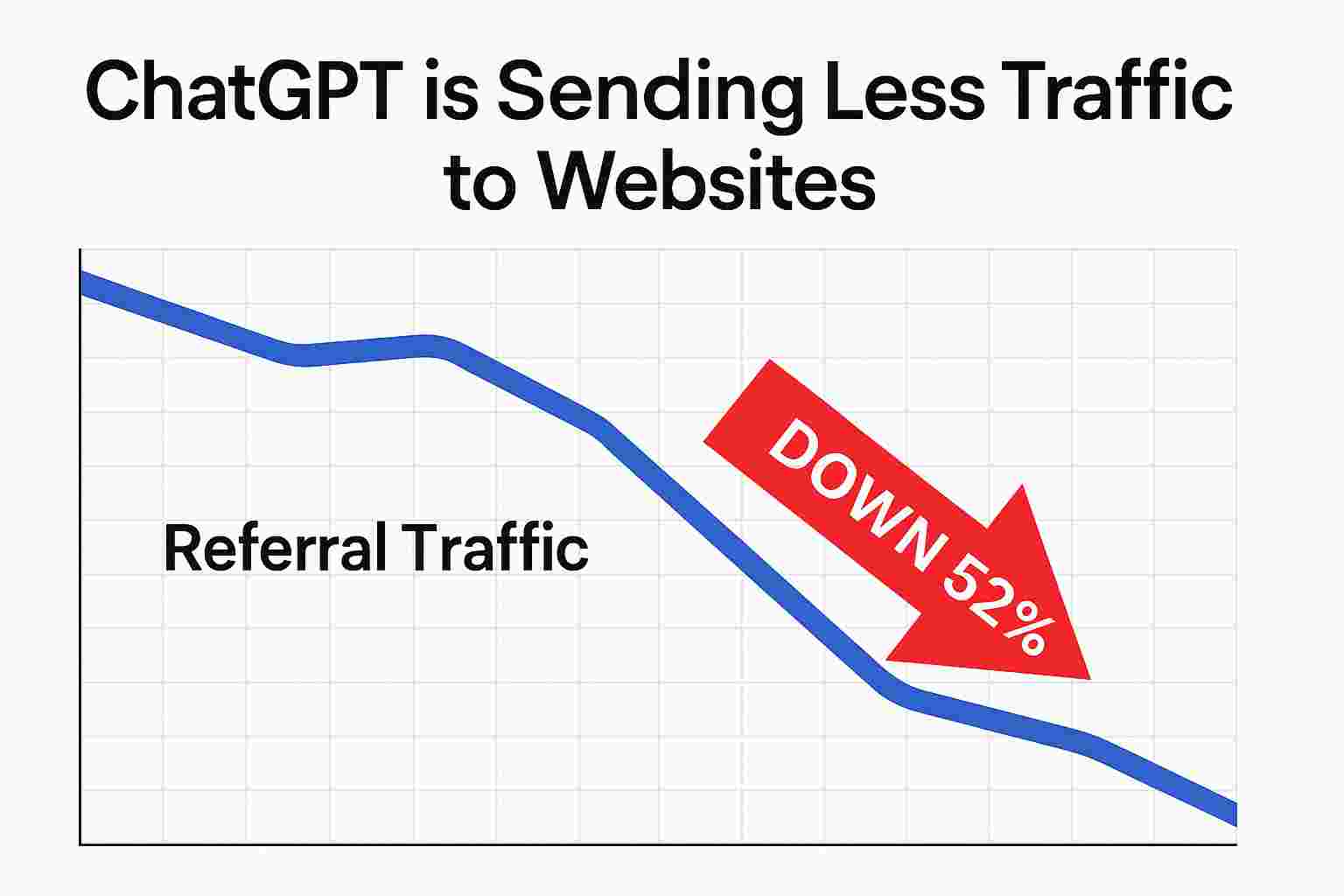Introduction
Have you noticed fewer clicks coming from ChatGPT to your website lately? You’re not alone. Only in a month, referral traffic from ChatGPT dropped 52%, which is a very steep decline. For businesses relying on AI-driven visibility, this sudden dip raises ones that are definitely something to ponder over. Why would this happen and what does that mean for SEO and digital marketing strategies in 2025?
Why is ChatGPT Sending Less Traffic to Websites?
The main reason is that ChatGPT increasingly delivers answer-first results directly inside the chat interface. Instead of pushing users to external links, it now provides summarized insights that satisfy the query instantly. As a result, fewer people are clicking through to websites. Industry watchers compare this shift to Google’s “zero-click searches,” where users find answers on the results page itself rather than visiting a site. According to industry research on zero-click searches, nearly 65% of searches already end without a click, and ChatGPT seems to be following the same pattern.
How Big is the Traffic Decline and Who is Impacted Most?
According to multiple reports, the referral decline is consistent across industries but publishers, blogs, and smaller businesses are feeling it most. For niche websites, where even a few hundred daily referrals make a big difference, losing half of that traffic is alarming. This change also impacts SEO professionals, since ranking visibility alone isn’t enough anymore you need strategies that attract engagement even when clicks drop. A detailed example can be seen in our article on AI Traffic SEO – How AI is Reshaping Search where we explain how AI search alters traffic patterns.
What Role Does AI Play in This Traffic Decline?
AI tools like ChatGPT are evolving into content aggregators rather than just referral engines. They pull information from multiple sources, blend it, and give users a final answer. This means your website might have contributed valuable data, but the user may never visit your page. As SEO strategist Mark Taylor explains, “AI isn’t killing traffic it’s changing the way traffic flows. Brands that adapt with unique insights, multimedia, and authority signals will still win.”
What Can Website Owners Do to Recover Traffic?
As an easy method for AI to summarize your content, better let KI do the summarization while you become smart: optimize for branded searches, because if a user searches his/her brand, then AI will lead to your site; invest in unique data and publish case studies, reports, or statistics that AI cannot easily duplicate; leverage multimedia such as videos, infographics, and interactive tools to engage users beyond plain text; build community trust through direct subscriptions, newsletters, and social media engagement to minimize reliance on third-party referrals. You can also explore how businesses are adjusting strategies in our post Potential SEO Clients May Want to Discuss AI Search.
Will SEO Strategies Need to Change in 2025?
Absolutely. SEO in 2025 is not just about ranking it’s about visibility plus engagement. With AI-driven platforms reshaping traffic, websites must focus on authority and user experience. Think about it: if ChatGPT can answer a question in one sentence, why would a user click through? Your job is to provide what AI can’t depth, personality, expertise, and trust signals.
Conclusion
A 52% decline in ChatGPT referral traffic should truly open the eyes of website owners. Rather than panicking over it, use this opportunity to reconsider your SEO strategy. Pay attention to building content that AI cannot just churn out, polishing your brand presence, and nurturing direct relationships with your audience. What do you think? Will AI change SEO forever, or is this just another phase of digital marketing? Share your thoughts below via the comments.
FAQs
Because ChatGPT answers many more queries instead of sending users away to other external websites.
Publishers, blogs, and small businesses that used to rely on AI referrals for a steady stream of traffic.
Yes, but SEO will have to change its focus on authority, unique insight, and brand trust.
Publish original research, case studies, or brand content that AI must cite.
Most probably, yes. AI platforms are working toward keeping users within their ecosystem.
